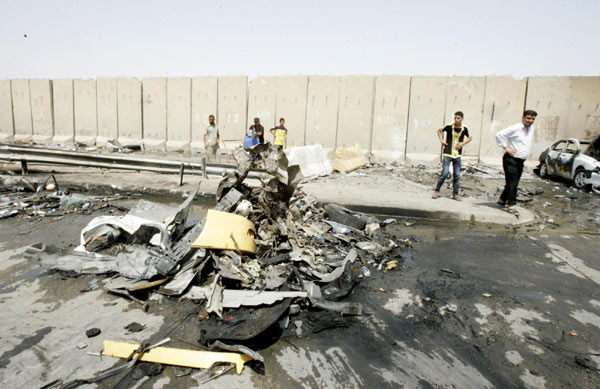BAGHDAD - Two car bomb explosions killed 32 Shiite pilgrims in Baghdad as millions of them ended Saturday a major ritual at a holy shrine in the Iraqi capital amid tightened security measures.
The deadliest attack occurred at about 2:00 pm local time (1100 GMT) when a car bomb hit a procession of Shiite pilgrims near Sanaa Square outside the holy Shiite shrine district of Kadhmiyah in northern Baghdad, killing 18 pilgrims and wounding 36.
An earlier car bombing took place around midday when a booby-trapped car struck a procession of Shiite pilgrims at an intersection in Shula district in northwestern Baghdad, killing 14 pilgrims and wounding 32 others.
The pilgrims were marching on foot to return to their homes after they participated in the observation of one of the major Shiite rituals at Kadmiyah's mausoleum of Imam Mussa al-Kadhim the 7th of the most sacred 12 Shiite Imams.
 |
|
Residents gather at the site of a bomb attack in Baghdad, June 16, 2012. [Photo/Agencies] |
During the past few days, large crowds of pilgrims from Iraqi cities and some Muslim countries flocked to Kadhmiyah to observe the annual commemoration of the Imam's death.
Iraqi authorities estimated that total number of pilgrims reached up to six millions by the end of the event which culminated on Friday and ended on Saturday.
"We have received more than six million pilgrims for the past few days until Saturday noon, some came from other countries", Fadhel al-Anbari, head of Kadhmiyah shrine told Xinhua.
Black-clad men and women from different ages in processions or individuals, some were waving black, green and red flags flocked to Kadhmiyah and gathered outside the shrine and took part in the Imam's symbolic coffin funeral.
Some pilgrims beat their chests and heads and performed self-flagellation with chains in honor of the Imam who was poisoned to death while in prison in the year 977 AD, during the Abbasid era.
During the days of the religious event Iraqi authorities tightened the security measures, as dozens of thousands of Iraqi security troops manned dozens of checkpoints and patrolled the routes of the worshippers across Baghdad, while army helicopters hovered overhead.
A traffic ban was imposed inside and around the district of Kadhmiyah and the troops blocked many roads leading to the main routes of the pilgrims across the capital in addition to blocking all the entrances to the holy site. Only pedestrians were allowed, but they have to cross several rings of security checkpoints.
Nevertheless, al-Qaida militant group in Iraq on Saturday claimed responsibility for a wave of coordinated attacks on Wednesday in Baghdad and other Iraqi cities, mainly targeted Shiite pilgrims and security forces, killing some 78 people and wounding some 300.
The self-styled Islamic State of Iraq (ISI), al-Qaida front in the country, said in a statement posted on an Islamic website that a series of coordinated attacks was launched on what the statement named "blessed Wednesday invasion".
Al-Qaida statement also said that Wednesday wave of violence is part of a series of attacks that included the suicide bombing on June 4, when a suicide car bomber struck the Shiite endowment office in central Baghdad, killing 20 people and wounding 125 others.
On June 11, al-Qaida claimed in a statement the attack on the Shiite endowment office and said that it was the first message for the Shiite community and a warning that what is coming in the future will be more devastating.
The Shiite and Sunni endowment offices are independent bodies affiliated to the government which are responsible for running the Shiite and Sunni mosques and their religious properties respectively.
Iraqi officials frequently blamed Al-Qaida militant group and some insurgent groups for carrying out attacks against Shiite pilgrims who perform communal rituals, killing and wounding hundreds of them in attempts to stir up sectarian strife among Iraqis to push the country to the brink of civil war, amid persistent political divisions that have already paralyzed the country's government.